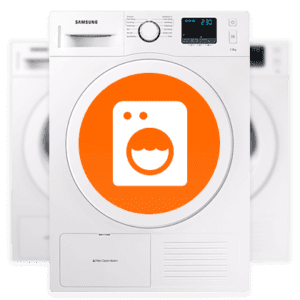Different types of washing machines
There are many things to consider when buying a washing machine, but sometimes one of them takes on extra importance. Because there are so many different types of washing machines out there, we understand that you may want to look for ones that meet all of those important criteria. These machines are ideal if you want to stack your washer and dryer.
Top loading washer
Any back problems? Choose a top loading washer so you don’t have to bend over as much.
Quiet washing machine
Mustn’t let the washing machine make too much noise?
Efficient washing machine
For the environment or your energy bill, here are the most efficient washing machines.
Fill weight 7kg
A small family with 1 or 2 people? Get a 7kg machine.
Fill weight 9kg
Having 3 or more children? Then you’ll need a washing machine with at least a 9kg capacity!
Comparing washing machines
There are an incredibly wide variety of washing machines to choose from – some even better than others! If you’re confused as to which one is right for you, it might help to compare some of the best washing machines. Look for the things that are important to you, such as fill weight, noise level, energy label and speed.
Buying a washing machine; what to look for
On average, washing machines last about 10 years. So it is not that often that you have to buy a new one. If your old washing machine is up for replacement, it is a good idea to find out exactly what you need to look out for. They evolve really fast! Below is a step-by-step guide to what you should consider when buying a new washing machine.
Type of washing machine
Depending on the layout of your home, you may prefer a top loading or a front loading washing machine. Most people go for a front loading one because you need to stack with another appliance, such as a dryer. The fill weight of a washing machine indicates how many pounds of laundry it can hold. This starts at 6 kg and goes up to 10 kg. It can be difficult to estimate how many kg of wash weight your household needs.
- Fill weight 6 kg to 7 kg: this is ideal for a family of 1 or 2.
- Fill weight 8 kg: this size is perfect for a household of 3 or 4 people, for example a young family.
- Fill weight 9 kg and 10 kg: these machines are made for a family with 3 or more children.
Energy Rating
The energy rating is what was formerly known as an energy label. The better the class, the more economical the washing machine is with electricity. For new washing machines, this ranges from energy class A to G – energy class A being the most economical. An energy-efficient washing machine is often more expensive to buy, but in use, you can actually save money with it. That way, an energy-efficient washing machine is not only good for the environment, but also for your wallet.
RPM
The speed of a washing machine indicates how many rounds the drum makes per minute while it is spinning. The more revolutions it makes, the drier your laundry will come out of the machine. Most modern washing machines start at 1100 rpm (rounds per minute) and this can go up to 1600 rpm. 1600 rpm gives you the driest possible wash. The majority of washing machines run at 1400 rpm max. Bear in mind that this often only applies to cotton wash programmes. Finer fabrics have a lower maximum spin speed.
Sound level
How much noise a washing machine makes during the spin cycle is indicated by “spin sound level”. This is expressed in decibels (dB) and broken down into 4 categories:
- Loud: 78 dB or louder.This washing machine is not recommended to be used when you sleep and is best placed in the attic or shed.
- Normal: 74 dB – 77 dB. Again, these washing machines are not recommended to be used while you sleep, but you can put it in an open kitchen, for example – especially if you don’t always wash when you’re at home.
- Silent: 72 dB – 73 dB. You can put this washing machine in an open kitchen, or even in the space next to your bedroom. It should also have no problem washing with it while you sleep.
- Extra quiet: 71 dB or less. This is a quiet washing machine that you can feel free to put in your studio or the room next to your bedroom.
Eventual extra conveniences
Bove are the main points to look out for when buying a washing machine – but there are others that you may find important too! Like a specific wash cycle or a particular feature that not every washing machine has. For some, these extras determine whether a washing machine is a good fit for them or not. For example, a self-cleaning detergent drawer, automatic detergent dosing and adding wash in between washes.
Washer selection tool
Do you want help replacing your old washing machine? With our washer selector, you tell us what you need, and we’ll find the best washing machines from 2024 that fit your needs.
Frequently Asked Questions
We love nothing more than helping others find the right washing machine for their situation and family. That’s why it’s so important that you don’t have any unanswered questions about washing machines. Of course, we can’t cover all the questions. If we can’t answer all your questions, don’t hesitate to contact us or your local washing machine supplier.
Which washing machine should I buy?
This is a tricky question to answer because it depends on many different factors. First of all, we recommend that you look at the fill weight. How many family members are going to wash with this appliance? After that, it’s a good idea to look at the energy class. This tells you how environmentally friendly the washing machine is, but also how much electricity it uses per wash – and therefore how it affects your energy bill. Finally, you’ve probably figured out where you’re going to put the washing machine. How much noise should it make in this location? If you’re going to put it in the room next to a bedroom, it’s best to choose a quiet washing machine. But if you are putting it in the attic, you may not have to worry so much.
Can’t quite figure it out? Then take a look at our washer selection tool. It allows you to easily answer a few questions, and we will pick out some of the best washing machines for you.
How much does a new washing machine cost?
The prices for washing machines vary widely. You can get one for as little as 300 euros or as much as 2,000 euros. It all depends on your requirements. The average washing machine, of good quality but without any fuss, will cost you around 700 euros. Keep in mind that you can save money with an expensive washing machine. Often, they have a better energy class, so they use less electricity. How many revolutions should a washing machine have?
Washers have a maximum speed, which indicates how many rounds the drum makes during the spin. Washing machines produced in 2020 or 2022 run most 1400 rpm and 1600 rpm. The more rounds the drum makes, the drier your laundry will come out. The max RPM often only applies to a cotton wash cycle. For more sensitive or delicate fabrics, the rpm will be lower.
What is the lifespan of a washing machine?
The lifespan of a washing machine is around 10 years, but some last less or much longer. Exactly how long your washing machine will last depends on several aspects. These include the number of washes per month, whether you stick to the maximum fill weight and how well you maintain it. For example: if you don’t take care of your washing machine properly, lime can form and this can damage the washing machine. It is also important that your washing machine is level – if it is not, it can vibrate unnecessarily during the spin cycle, which can damage components.
What is the most energy-efficient washing machine?
All washing machines are rated according to energy class. The energy class, formerly known as energy label, indicates how economical an appliance is with power. The higher the energy class, the more efficient the washing machine. If you’re looking for an energy-efficient washing machine, you should keep your eyes open for energy class A – it uses the least energy per wash. Most modern washing machines have an energy rating between D and A.

